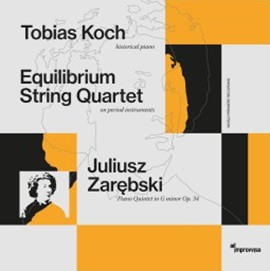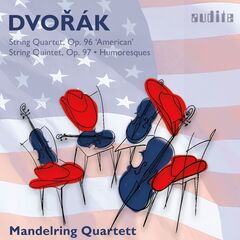Die vorgestellten Kammermusikwerke sind ebenso wenig ohne die bei Dvoraks Aufenthalt in den U.S.A. von der dortigen Musik aufgesogenen Erfahrungen, denkbar, wie sie, vor allem bei den Humoresken, ohne seine böhmische Herkunft gehört werden können. Während das Quartett und das Quintett vor allem beim Leben im dörflichen Spilville entstanden, spielen bei den Humoresken auch die Eindrücke aus New York hinein. Die im Geiste der lokalen, also indianischen Musik geschriebenen Stücke verbreiten einen idyllischen Charakter.
Das Mandelring Quartett, beim Quintett um seinen früheren Bratscher Roland Glassl ergänzt, trägt dem in seinen Interpretationen Rechnung. Sie beschwören geradezu die Stimmung eines Landausflugs in guter Stimmung bei feinstem Wetter herauf. Weder umtriebige Hektik noch aufgesetzte Jovialität oder der Charakter einer dörflichen Feststimmung klingen auch nur an. Vielmehr wird mit edler Zuwendung und gepflegter Herangehensweise agiert. So gewinnen die Werke gegenüber den Interpretationen, die auch deftige oder tänzerische Aspekte betonend antreten, an Feinheit und Eleganz. Damit erhalten die Stücke eine eindringliche, weniger aufdringliche, Erzähllinie die ihnen extrem gut tut.
Die ungekünstelte Spielweise kommt den Schilderungen der Natureindrücke, auf die der Fokus des Quartetts gerichtet ist, ebenso zugute wie auch die Sehnsucht nach der böhmischen Heimat, die man im zweiten Satz hört oder dem Gesang eines Vogels im Scherzo.
Dem schnell geschriebenen Quartett folgte sogleich und so schnell das Quintett. Wie weit die Einflüsse der Musik etwa der indianischen Gruppe der Kickapoo, die ihm traditionelle Tänze und Lieder vorspielten, eingeflossen sind, ist nach wie vor nicht belegbar. Aber Stilmittel, die diesen Geist verströmen wie einfache Strukturen und gleichbleibende rhythmische Muster sowie Trommelimitationen lassen sich nachvollziehen. Das Mandelring Quartett und Roland Gassl zeigen diese Elemente eloquent auf. Dabei berauben sie die Musik nicht ihrer Geradlinigkeit, doch formen sie die Sätze mit Sorgfalt und Liebe zum detaillierten Blick.
Die Humoresken, eigentlich für Klavier verfasst, sind hier in der von Matthias Eichhorn arrangierten Fassung für Quartett zu hören. Der Titel täuscht eine Unbeschwertheit vor, die sich aus der Musik nur teilweise entnehmen lässt. Vielmehr spielt auch eine betrübliche Seite hinein. Das Mandelring Quartett bewegt sich sicher auf einer ebenso die tiefsinnigen wie auch die leichteren Momente betrachtenden Linie.
The chamber music works presented here are just as inconceivable without the experiences that Dvorak absorbed from the music there during his stay in the United States as they are without his Bohemian origins, especially in the Humoresques. While the quartet and the quintet were primarily written while living in the village of Spilville, the humoresques also reflect his impressions of New York. The pieces, written in the spirit of local, i.e. Indian music, exude an idyllic character.
The Mandelring Quartett, with the addition of its former violist Roland Glassl in the quintet, takes this into account in its interpretations. They almost conjure up the mood of a shore excursion in good spirits in the finest weather. There is no hustle and bustle, no artificial joviality and no hint of a village festival atmosphere. Rather, the music is performed with noble affection and a refined approach. In this way, the works gain in refinement and elegance compared to the interpretations that also emphasize hearty or dance-like aspects. This gives the pieces an emphatic, less intrusive narrative line that is extremely beneficial to them.
The unaffected style of playing benefits the descriptions of the impressions of nature on which the quartet focuses, as well as the longing for the Bohemian homeland heard in the second movement or the song of a bird in the scherzo.
The quickly written quartet was immediately followed by the quintet. The extent to which he was influenced by the music of the Kickapoo Indian group, for example, who played traditional dances and songs for him, is still not verifiable. But stylistic devices that exude this spirit, such as simple structures and consistent rhythmic patterns as well as drum imitations, can be traced. The Mandelring Quartett and Roland Gassl demonstrate these elements eloquently. They do not rob the music of its straightforwardness, but they shape the movements with care and attention to detail.
The Humoresques, originally written for piano, can be heard here in the version for quartet arranged by Matthias Eichhorn. The title suggests a light-heartedness that can only be partially inferred from the music. In fact, there is also a sad side to it. The Mandelring Quartett moves confidently along a line that considers both the profound and the lighter moments.























